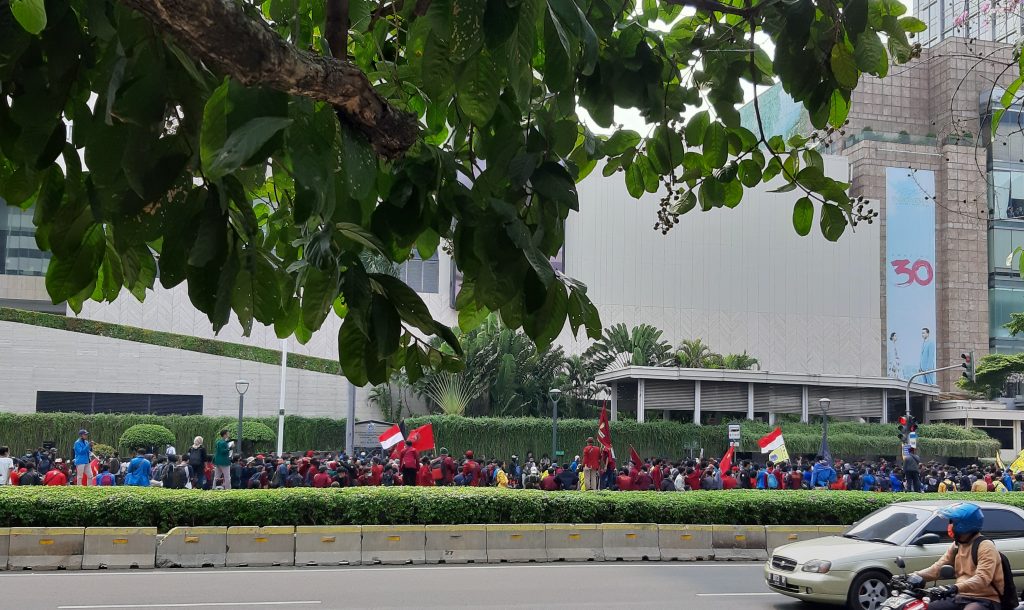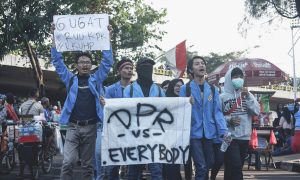It is no exaggeration to say Indonesia is on the brink of a human rights crisis.
While the country struggles to contain the spread of COVID-19 that has sickened and killed hundreds or thousands of its population, forcing many of its citizens to stay home, its government and parliament have enacted a law that will deny the rights of the very people most vulnerable to the multiple effects of the pandemic.
The omnibus law on job creation, the Indonesian government and parliament claim, is a necessary instrument to salvage the country from sinking deeper into the pandemic-induced recession. But trade unions and human rights groups believe it is in fact no more than an attempt by the nation’s oligarchs to roll back political reform in the country of 270 million people, many of whom are now living in or on the brink of poverty due to COVID-19.
Such a grim conclusion is not unwarranted for at least three reasons. First, the law will only hurt the country’s population, particularly those who are marginalized. Second, the way the law was drafted, deliberated and passed clearly breaches international laws. Third, the law is blatantly designed to favour the politico-economic elite and foreign corporations over the Indonesian people. It is, in its most simple and harrowing analogy, a license for the powers that be to exploit millions of the nation’s workforce and plunder its natural resources, mainly its forests, on which many local indigenous people depend for a living.
Betrayal of public trust
The law was deliberated without adequate public consultation, leaving trade unions, civil society groups and academics in the dark over its content and forcing them to second-guess even the most controversial provisions. In a glaring example of the betrayal of public trust by elected officials, the Indonesian parliament finalized the bill over the weekend and passed it into law on Monday, shortly before trade unions were able to organize rallies.
The government claimed to have involved 14 trade unions as part of the Public Consultation and Coordination Team on the Omnibus Bill. However, the trade unions denied the claim, saying that they had not been involved at the bill’s inception. According to our records, the government had not provided an opportunity for public participation even up until the Coordinating Minister for the Economy, Airlangga Hartarto, submitted the bill to the Speaker of the Indonesian Parliament, Puan Maharani, on 12 February 2020.
This is non-compliant with Article 25 of the International Covenant on Civil and Political Rights (ICCPR), ratified by Indonesia in 2005, which grants the people the right to “to take part in the conduct of public affairs, directly or through freely chosen representatives.”
A wave of protests by students and labour groups against the law have been taking place across the country, some of them were met with excessive force by the police. The local authorities are fully aware of how the people would react to the passage of the law, with the national police chief, Gen. Idham Azis, instructing his men to conduct online surveillance on activists, counter online narratives against the law and ban all kinds of rallies. There is a risk that even before the law takes effect, it may have triggered a wave of human rights abuses.
The lack of information regarding the bill’s content is one the reasons it is so controversial. The government appears to have deliberately created confusion among the public at a time when the country’s cyberspace is littered with fake news and misinformation. Two days after the passage of the law, the government and the parliament had yet to officially release the final version of the law, leaving the public questioning the validity of the document they peruse. Some lawmakers even bizarrely claimed to have not read the law.
The multiple effects of a retrogressive law
The fact that the Indonesian parliament and government decided to press ahead with the law’s deliberation during a pandemic—forcing the people to choose between defending their rights and contracting a deadly disease—is outrageous enough. However, we believe that its provisions have an even more far-reaching human rights consequences.
Based on our review of the latest draft of the law circulating among civil society groups, the law breaches the principles of non-retrogression and progressive realization stipulated in the International Covenant on Economic, Social and Cultural Rights (ICESCR) that Indonesia ratified in 2005. In short, the law provides lower level of protection of economic, social and cultural rights that the previous legislation that was far from perfect.
Consider the labour and environment clusters of the omnibus law.
Article 59 of the law, for example, eliminates the maximum period of temporary work agreement, practically depriving millions of the Indonesian people of job security and full employment benefits. Article 77 and 78 exempt workers in “certain sectors” from humane working hours and overtime compensation, while Article 88C scraps the component of basic cost of living, or KHL, in the minimum wage formulation for workers. These provisions would deny the people their right to just and favourable conditions of work.
Jumisih, the deputy head of the Indonesian Labor Union Federation (KSBI), told a press conference held by Amnesty International Indonesia that the previous labour law was bad enough for workers, the new omnibus law on job creation would make it even worse.
One of the most destructive aspects of the law is its provisions in the environment cluster, which we believe are designed to expand the role of the central government and significantly reduces public participation in the decision making process on environmental matters that would have tremendous impacts on the local communities. This policy practically removes any legal protection for the marginalized people and those who defend them.
Article 29, 30 and 31 of the law, for instance, retain the environmental impact assessment document (AMDAL) requirement for companies, but abolish the independent committee—consisting of environmental experts, public representatives and NGOs—tasked with reviewing the AMDAL document. While the law states that the AMDAL assessment involves a consultation with affected communities, it is unclear if the said consultation will be considered for the issuance of the AMDAL document itself, especially since the review committee will be abolished. This means the authorities could decide on serious environmental matters with minimum, if not zero, oversight from the people that would suffer from their negative impacts.
Jokowi's priorities for his second term revolve around human resources development, but not human rights.
Development under Jokowi leaves human rights behind
Furthermore, Article 50(2), Article 12A and Article 17A of the law ban cattle farming in all forestry areas and any types of commercial activities in unregistered customary forests despite the fact many customary forests are currently unregistered. These policies are in a clear violation of international norms, including the ICESCR and the UN Declaration on the Rights of the Indigenous Peoples that grant local communities to be involved in a policy making that affects their lives, and also the right to own and use land, water and other resources. The law goes against recommendations of UN CESCR Committee to ensure respect of free, prior and informed consent on decisions affecting the indigenous communities and their resources.
This year alone, Amnesty International has recorded the arrest, attach and intimidation of at least 61 human rights defenders, including indigenous community leaders, for defending their rights in conflicts with corporations and state institutions. The latest incident took place in Langkat, North Sumatra, where the indigenous community of Penunggu clashed with security forces, including military members, while defending their customary land from state-owned plantation company PT Perkebunan Nusantara II (PTPN II).
With the omnibus law laying a red carpet for corporations to extract the country’s natural resources with minimum, if not zero, hindrance, we believe human rights abuses against local communities will only increase in the years to come if the new law stays intact.
A recently published biography of President Joko Widodo describes the former furniture seller as a “man of contradiction”. Given his political decisions in the past few years, ranging from crippling the Corruption Eradication Commission (KPK) to appointing people with chequered human rights records to his Cabinet, the depiction could not be further from the truth. For many Indonesians, the president is clearly on the wrong side of history.
A human rights crisis is on the horizon for the country already stricken by a pandemic. Only President Jokowi has the power to prevent Indonesia from plunging into it.
 Facebook
Facebook  Twitter
Twitter  Soundcloud
Soundcloud  Youtube
Youtube  Rss
Rss 



